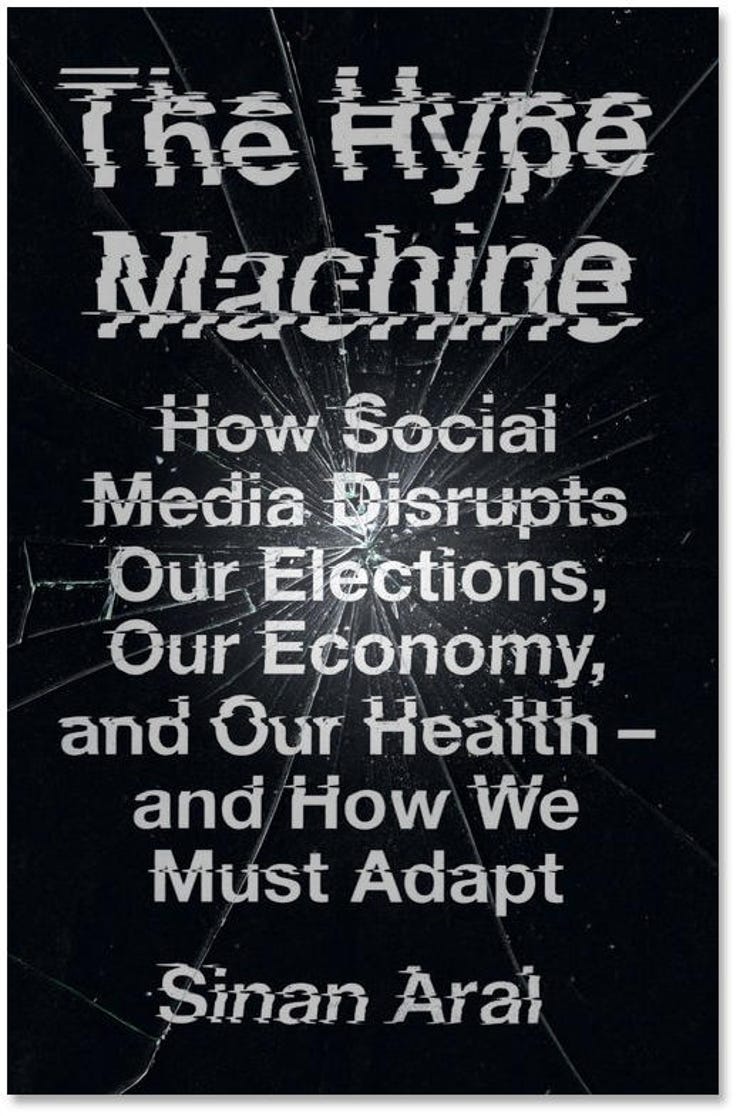The Hype Machine, book review: Inside the 'social media industrial complex'


The Hype Machine: How Social Media Disrupts Our Elections, Our Economy, and Our Health - and How We Must Adapt • By Sinan Aral • HarperCollins • 390pp • ISBN: 978-0-00-827711-6 • £20
Ten years ago, Jeff Chester, director of the Center for Digital Democracy, issued a warning: the vast piles of data being collected and the techniques being developed by the advertising industry would open the way for a highly discriminatory society and political manipulation. Then came 2016, Cambridge Analytica, the EU referendum vote, and the election of Donald Trump to the US presidency, all of which led to the close scrutiny of platform manipulation.
In The Hype Machine, MIT professor Sinan Aral examines the growth of the "social media industrial complex" -- the 'hype machine' of the title -- and considers what we should do about the many problems it has brought: widespread false news, threats to election integrity, harmful speech, and concentrated power exercised in inscrutable ways.
Aral brings multiple perspectives to his subject, beginning with a PhD dissertation he began in 2001, choosing as his subject the newly forming digital social networks, and continuing through entrepreneurship, consultancy, venture capital, and more academia. At MIT, he leads the Initiative on the Digital Economy, where he recently organised a social media summit that featured the same broad topics he considers in this book.
SEE: Guide to Becoming a Digital Transformation Champion (TechRepublic Premium)
The Hype Machine, like many of the latest generation of technology books, does not huddle in the US. Aral's story starts, for example, with the 2014 Russian takeover of Crimea. His lab, which was studying how fake news spreads online, found its interest piqued by spikes showing Russia's use of social media to control perception within Ukraine. From this and other research Aral derives the Hype Loop -- a description of the machine-human interaction that sits between the network substrate and the medium we use (mostly smartphones). In that rendering, the feedback loop of the hype machine acts as amplifier and manipulator.
Aral identifies four levers for controlling such systems: money, code, norms, and laws (in 1996, Lawrence Lessig had these as market, system architecture, norms, and laws in Code and Other Laws of Cyberspace). He then goes on to discuss how and why these social networks work, based on his formal study.
Forcing change
Aral's final section, which discusses how to force change, rejects many currently popular approaches. He calls breaking up Facebook "like putting a bandaid on a tumor", and appears unhappy with the European General Data Protection Regulation (GDPR), which he says is blocking medical research because European countries are legally barred from sharing data such as DNA samples with US organisations. While we might say there's an easy fix if the US cares to take it, he contends that GDPR can be weaponised to interfere with the public's right to know, citing a Romanian government action against journalists who exposed massive election fraud.
Aral's preferred approach is to mandate interoperability and data portability, find a middle path for the US between China's surveillance state and the EU's data protection, and, most of all, set up a national commission on technology and democracy to include scientists, industry representatives, and policy makers. Such a group will need broader representation than that, but it's a start.
RECENT AND RELATED CONTENT
New poll shows Facebook's severe trust problem
Facebook's Mark Zuckerberg tells Congress how to tweak Section 230
Facebook tackles deepfake spread and troll farms in latest moderation push
Apple CEO sounds warning of algorithms pushing society towards catastrophe
What is GDPR? Everything you need to know about the new general data protection regulations
Read more book reviews
- The Hidden Power of Systems Thinking, book review: Reinventing governance
- Ask Your Developer, book review: How to prosper in a 'build or die' business landscape
- Lurking, book review: A people's history of online culture
- Augmented Reality, book review: Exploring the attractive and alarming potential of AR
- The Entrepreneur's Faces, book review: A compendium of startup stories